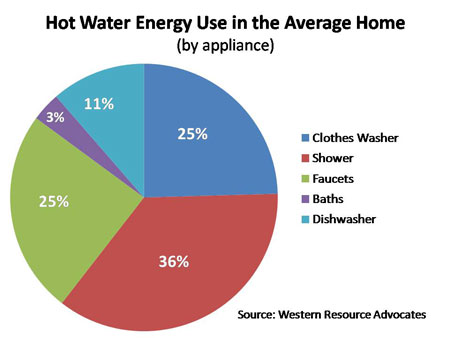The Water Energy Connection, Tips to Save Inside, Tips to Save Outside, Tools & Calculators, Take our Pledge to Save, View the H2O Hero Rises PSA, HRWC Pogram Description
When You Save Water.
- You save money on your utility bills
- You save the energy that goes to pump, treat and heat water
- You reduce your greenhouse gas emissions
- You keep more water in our rivers, lakes, wetlands and underground aquifer
Released June 2014: The Carbon Footprint of Domestic Water Use in the Huron River Watershed
It Takes Energy To Use Water.
In the U.S., more than 13% of our total electrical energy goes to pump, treat and heat water supplies.
The typical American uses 99 gallons of water a day for activities like washing clothes, bathing, toilet-flushing and cooking.
Consider the energy-intensity of those 99 gallons. Embedded in our water-use is the energy needed to bring it into our homes and take it away for treatment. Your water utility uses pumps and equipment to pull water from your nearby lake, stream or underground aquifer, to clean and treat it and then to push it through miles of pipes until it reaches your home. Your wastewater makes the same journey in reverse.
Your wastewater makes the same journey in reverse.
There is also the energy needed to heat water once it gets to your home, or its end-use energy. Our showers, faucets, clothes washers and dishwashers all use hot water. Energy for water heating alone accounts for 74% of total water-related energy use.
Water Has Its Own Carbon Footprint.
Carbon dioxide emissions from water-related energy consumption account for about 5% of U.S. CO2 emissions annually, or 290 million metric tons.
This is the equivalent of the annual greenhouse gas emissions of 53 million passenger vehicles or the annual electricity use of over 40 million homes.
Imagine If We Each Save A Little.
The average reduction in hot water use for households installing efficient fixtures and appliances is 10.8 gallons per day, or a reduction of approximately 20%.
If every household in the U.S. achieved similar savings, residential hot water use would be reduced by approximately 4.4 bilion gallons per year. Resultant energy savings would be 41 million MWh electricity and 240 billion cubic feet of natural gas with associated CO2 reductions of about 38.3 million metric tons.
Here’s How You Can Save:
- Tips for Smart Water Use Inside
- Tips for Smart Water Use Outside
- Take our Pledge to Save
- View the H2O Hero Rises PSA



